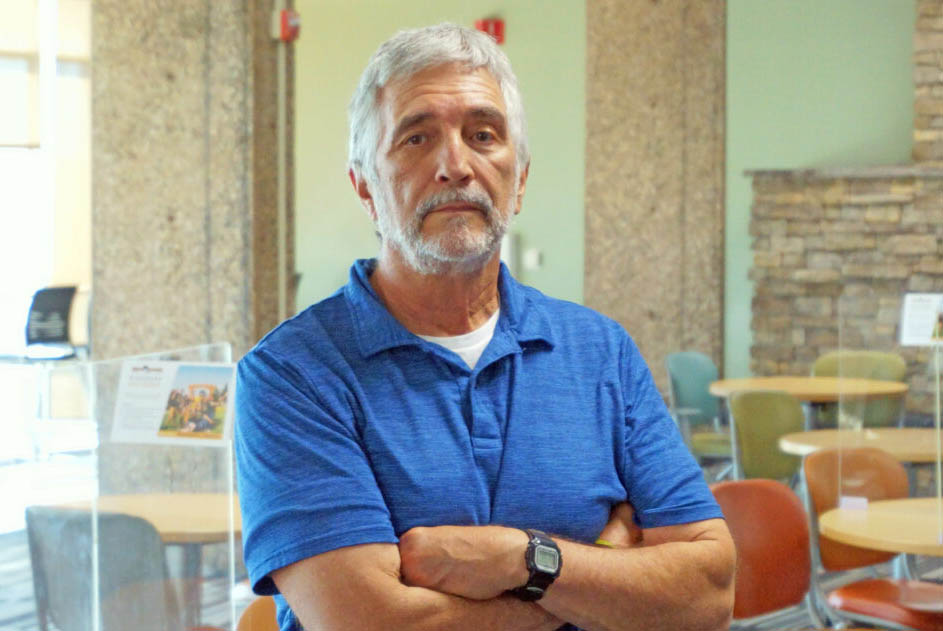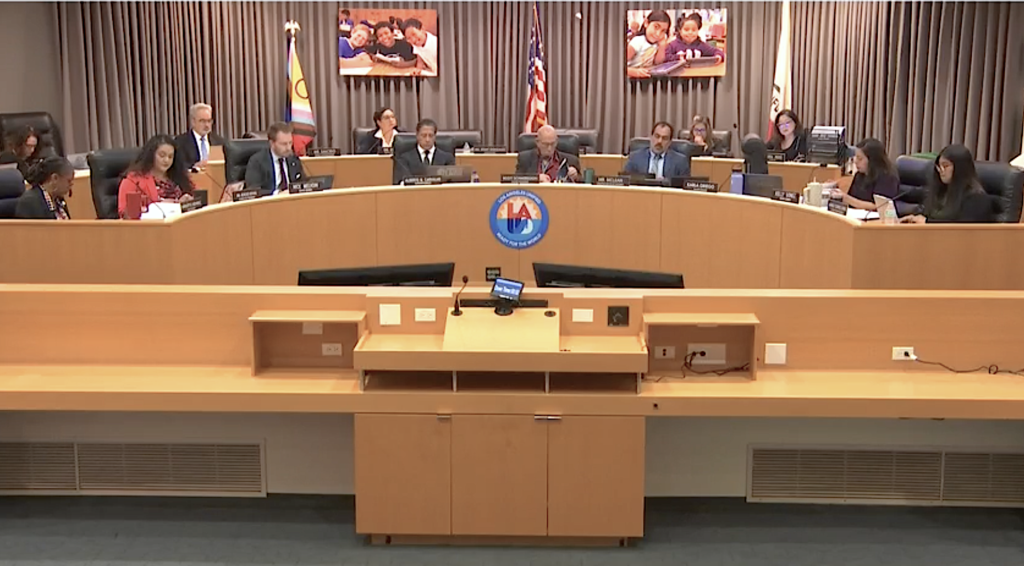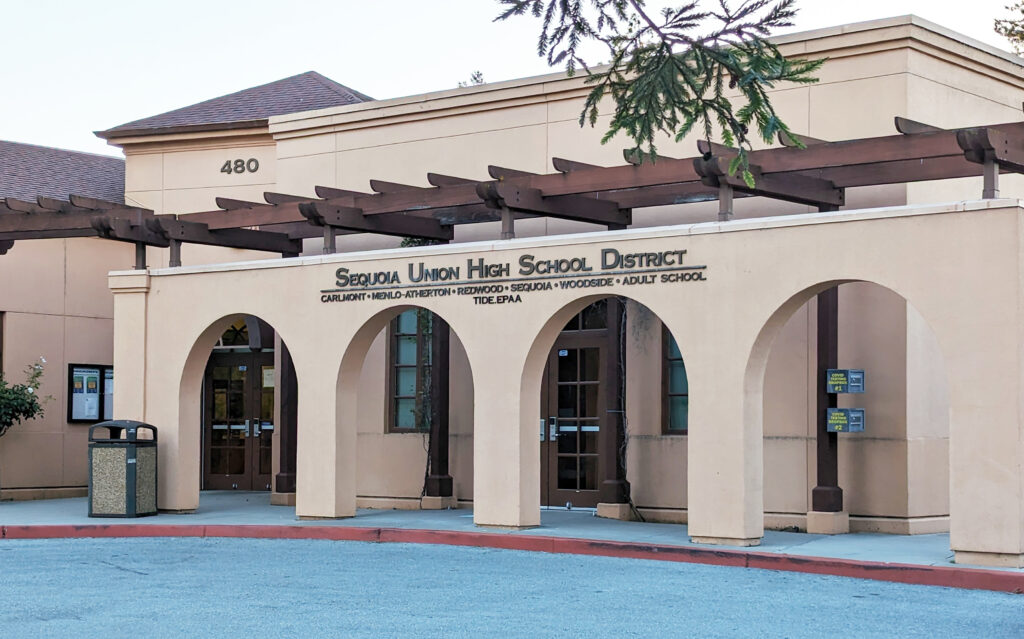
Sequoia Union High School District in Redwood City.
Credit: Flickr
The parents of a former student of a San Jose charter school and six families in a wealthy Bay Area high school district have filed separate lawsuits charging “rampant” civil rights violations resulting from bullying, taunting, ostracism and other forms of antisemitic conduct. In the lawsuit brought against the Sequoia Union High School District, the families claim school officials ignored and showed “a deliberate indifference to the problem.”
Both lawsuits, which were filed in the U.S. District Court of Northern California, say the discrimination escalated following the October 2023 attack on Israeli communities by Hamas and the Israeli retaliation and invasion of Gaza.
The lawsuit against the Sequoia Union High School District also reflects tension over how the ongoing conflict in Gaza has been taught in two Sequoia Union high schools as well as other districts engulfed in investigations and litigation.
The Office of Civil Rights in the U.S. Department of Education is investigating whether Berkeley Unified failed to respond to rising incidents of antisemitism in its schools. Last month, several Jewish teachers in Los Angeles filed a lawsuit to overturn collective bargaining laws that they said force them to belong to a teachers union that helped create an ethnic studies curriculum that “is patently antisemitic.”
Next month, an Orange County Superior Court judge will consider two nationally known Jewish legal groups’ motion to void an ethnic studies curriculum in Santa Ana Unified. They claim it was written by teachers and staff members who privately expressed antisemitic remarks and excluded Jewish community members from participating in the curriculum process.
In their lawsuit, filed Friday, the six Sequoia Union High School District families named Woodside High Principal Karen Van Putten and three administrators of Woodside High, where five of the students attend, as well as Menlo-Atherton High School Principal Karl Losekoot, Sequoia Union Superintendent Crystal Leach, two district administrators, all five district board members, and Gregory Gruszynski, a history teacher at Woodside High.
Placing the lawsuit in a wider context, lawyers for the Sequoia Union lawsuit said “leftist academics” have spread an ideology that “falsely portrays Jews as oppressors, engaged in ‘exploitive capitalism’ in the West and or ‘colonialism’ in the Middle East.”
“The result is not only a reprehensible failure of pedagogy but a hostile learning environment for Jewish students” — including in some Sequoia Union classes where the ideology is taught, the Sequoia lawsuit said.
It cites as a relevant party but not a defendant the Liberated Ethnics Studies Model Curriculum Consortium, whose member groups are selling curriculum and training teachers in dozens of California districts.
Curriculum issues are not directly at issue in the lawsuit against University Prep Academy in San Jose. In that case, student Ella Miller, 13, and her parents filed the lawsuit on Oct. 23 against the charter middle and high school and its executive director. After months of abuse during which students taunted her as “the Jew” or “Jew,” Miller withdrew from the school and now attends a private school, the lawsuit said.
The lawsuit also named as defendants the Santa Clara County Office of Education, which approved and oversees the charter school, and the California Department of Education, including State Superintendent of Public Instruction Tony Thurmond. The lawsuit claims county and state officials failed to respond to the family’s formal complaint that Ella’s rights had been violated or to intervene after learning of her mistreatment.
The 55-page filing does imply some teachers were hostile to Israel. Ella’s father, Shai Miller, an Israeli, said he noticed on back-to-school night that Israel was erased from maps of the modern Middle East in Ella’s history class.
Ella, who identifies as an Israeli American and speaks fluent Hebrew, has spent summers in Israel with cousins, the lawsuit said. The Oct. 7, 2023, attack by Hamas, in which 1,200 Israelis were slaughtered, distressed her and her family. She was visibly upset in history class on Oct. 9, the first day back in school after the attack, the lawsuit states. But before allowing her to go to the bathroom to collect herself, her teacher told her she had to read aloud something he had written “to the effect that, in the past, Palestinians and Jews had gotten along.”
The lawsuit alleges that “this requirement to publicly espouse a position that was at odds with present-day reality was overwhelmingly oppressive and humiliating. It also further identified Ella as ‘the Jew’ to her classmates.”
Did history teacher show bias?
Allegations of prejudiced classroom instruction that included antisemitic materials are a central element of the lawsuit against Woodside and Menlo-Atherton, two of four high schools in Sequoia Union, a demographically diverse, 10,000-student high school district.
Of Woodside High’s 1,646 students, 50% are Hispanic, 42% are white, 4% are Asian and 1% are Black. Only 28% were identified as low-income. Its students include low-income sections of Redwood City, and Woodside and Atherton, which are among the wealthiest ZIP codes in the United States.
The lawsuit claimed that Gruszynski, a Woodside High history teacher who currently chairs the bargaining committee for the Sequoia District Teachers Association, “singled out and harassed L.K. (all plaintiff students are identified with initials), the only openly Jewish student” in his 10th grade world history class.” Gruszynski displayed a “Free Palestine” bumper sticker on his classroom wall. The lawsuit stated that he “mocked her beliefs, undermined her attempts to provide factual information to classmates, and coerced her into endorsing his biased and ahistorical views to achieve satisfactory grades on exams.”
On a multiple-choice test, for example, the correct answer to the definition of Hamas, which the United States government has designated a terrorist organization, was a “Palestinian political party which is continuing to fight against Israel.”
“In this way,” the lawsuit said, “Gruszynski forced a Jewish student to condemn Israel and disavow her beliefs in order to receive a passing grade.” The lawsuit said that L.K. returned home in tears after Gruszynski’s classes and decided she could not participate in any further classroom discussions “without inviting further harassment.”
L.K.’s father, Sam Kasle, filed a complaint against Gruszynski, who refused to meet with him. Kasle requested to see Gruszynski’s course materials, which he, like other parents, had a right to review, but the district rejected that request. In response to the complaint, the vice principal disputed that Gruszynski made L.K. feel “uncomfortable” or “browbeaten,” and considered the case closed without reporting any action taken.
Student handbook guarantees civil rights
David Porter, University Prep Academy’s executive director, said the school’s attorney advised him not to comment on the lawsuit because it is an ongoing complaint. However, he did say that as the case proceeds, “what actually happened will come forward.”
He added, “Our student handbook’s policies around bullying and discrimination are strict, and we follow them as written.”
The school’s staff and student handbook for 2023-24 was expansive on protecting students’ civil rights, and the lawsuit extensively quotes from it. “The University Preparatory Academy Board and Staff commit to raise our voices against racism, unconscious bias, intolerance, injustice, and discrimination starting by reflecting on our own policies and actions,” it read.
Another section that the lawsuit cites states that, “To the extent possible, UPA will make reasonable efforts to prevent students from being discriminated against, harassed, intimidated and/or bullied, and will take action to investigate, respond, and address and report on such behaviors in a timely manner.”
David Rosenberg-Wohl, the family’s attorney, said the anti-discrimination language “is obviously important to the school, and so if the school does not honor it, that’s relevant because it suggests that one group does not count.”
“Everybody talks the talk,” he said.
In the days following Hamas’s attack, the discrimination against Ella intensified, the lawsuit said. This was before the Israeli army’s counter-attack and continued occupation, in which Gaza health officials say more than 40,000 Palestinian people, including many women and children, have been killed, and hundreds of thousands of Gazans have been displaced.
The lawsuit further alleges that two girls, who said they were Palestinian, told Ella, “Jews are terrorists,” and asked her, “Do you know your family in Israel is living on stolen land?” Of dozens of girls who had been friendly to her, only one girl would speak to her.
Students began to call her “White Ella,” progressing to “White Ella’s family are terrorists;” two boys chased her around the school, yelling, “We want you to die,” the lawsuit said.
During the three months between Oct. 7, 2023, and Jan. 9, 2024, when Ella withdrew from University Prep Academy, the family had multiple meetings with school administrators, including Porter, the school’s executive director, but felt that the school failed to acknowledge and address the bigotry and harassment she faced.
Complaints with no response
On Jan. 22, Ellla’s mother, Elisa, filed a formal complaint with the Santa Clara County Office of Education, the charter school’s authorizer. By law, the office had until March 24 — 60 days — to respond. On May 6, according to the lawsuit, a spokesperson for the Bay Area Jewish Committee met with May Ann Dewan, then county superintendent, to request that she intervene and answer the complaint. In its answer on May 14, the county said the complaint does not fall within its oversight of University Prep Academy, and the complaint could be filed instead with the California Department of Education.
Miller did that, and, on June 10, the department notified her that the complaint had been forwarded to Porter, who had until July 13 to respond.
Since then, the lawsuit said, there has been no response from Porter, the school, the county office, or the state Education Department. “Doing nothing … despite knowing of the anguish of Ella and her family, was deliberate indifference,” it said.
The family is seeking damages for Ella’s emotional and physical stress, the cost of a private school, and her lost access to educational opportunities.
Long-standing ‘antisemitic sentiment’
The lawsuit by the Sequoia Union families also cited “deliberate indifference to anti-Jewish harassment,” which it said started well before the Oct. 7, 2023, Hamas attack. In one incident, according to the lawsuit, a long-term substitute teacher, who continues to teach at Menlo-Atherton High, asked plaintiff W.K. about his background. Told that his family is Jewish, the teacher allegedly shared jokes about the Holocaust with a group of students: “How do you fit 10,000 Jews in a Volkswagen?” she asked. “In the ashtray.”
After the start of the Israeli-Hamas conflict on Oct 7, however, antisemitic incidents “surged,” the lawsuit said, citing several examples.
A group of Woodside students yelled, “Go back to where you came from!” to another Jewish student at Woodside High. No disciplinary action followed, the lawsuit said.
About that same time, a group of Menlo-Atherton students taunted plaintiff W.K. on the way to class, calling him a “kike” and said, “All Jews should die.”
On Nov. 1, two swastikas were etched into the pavement in Woodside High. (Swastikas had been drawn on bathroom walls in Menlo-Atherton high a year earlier.) Two days later, Woodside High Principal Karen Van Putten emailed the Woodside community that an extensive investigation by school administrators and the San Mateo Sheriff’s Department confirmed that the swastikas were actually “spiritual symbol[s] from Japanese Buddhism known as Manji popularized by anime.”
The lawsuit called the investigation a “sham” that, in fact, did not involve the sheriff’s department. Citing administrators’ dismissal of the swastika incident, other derogatory remarks, and the failure of Van Putten and the Sequoia school board to address incidents, Scott and Lori Lyle, parents of a 12th grader at Woodside High, filed a detailed formal complaint.
With no answer and no action taken in response for more than 200 days, the Jewish families filed their lawsuit, citing violation of Title VI of the Civil Rights Act, the U.S. Constitution’s Fourteenth Amendment’s guarantee of equal protection under the law, the First Amendment’s right to free exercise of religion and freedom of speech, as well as protections under California education laws and the state constitution.
Filing a lawsuit is a huge step for families, said Lori Lowenthal Marcus, legal director for The Deborah Project. “Students don’t want to embarrass teachers, risk ridicule and humiliation. All of the families went through internal procedures. They tried to speak with principals; they filed complaints to see if they could rectify their situations, but all felt let down. A lawsuit was the next option.”
The families are seeking the court to order a dozen remedies. They include:
- prohibiting discrimination and harassment of their children;
- prohibiting the district from engaging in any antisemitic conduct;
- ordering the district to implement a comprehensive policy addressing antisemitism;
- providing training for all teachers, administrators and staff in strategies to promote empathy and respect for Jewish individuals and their connection to Israel;
- terminating any teachers found to have engaged in antisemitic discrimination; and
- creating transparent requirements for disclosing course materials to the public.
The families also call for appointing a special master to monitor compliance with the court’s orders for three years.
The Deborah Project, a public interest law firm that defends the civil rights of Jews in educational settings, with pro bono assistance of California attorneys in the global law firm Ropes and Gray, are representing the families. The case is Kasle, et al. v. Van Putten, et al.
Naomi Hunter, public information officer for Sequoia Union, said the district has not yet been served with the lawsuit. “We support a safe environment for all students, and we are very concerned any time we receive a complaint about a hostile environment, but we cannot respond further until we have more information,” she said.





